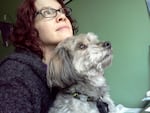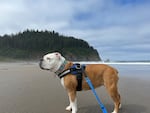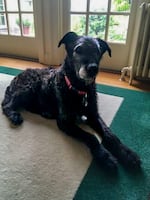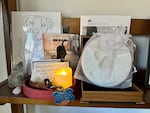Nearly two-thirds of Americans own a pet, and according to a Pew Research Center survey nearly all of them consider their animals part of the family. So it may not be a surprise that for some people the pain and grief felt after a pet passes can be as traumatic as the death of a person. And while most religions have traditions around honoring the dead, and communities have resources to support a person who is grieving, that’s not always the case for when the loved one lost is an animal.
“Grief is grief — there isn’t a hierarchy,” said Deanna Hagy, an end-of-life doula in Portland. “I know that our society doesn’t always take pet loss seriously, [but] this grief is no less valid than any other death.”
Just before Christmas in 2020, Hagy lost her beloved dog Fozzie. But even with all of her experience helping people navigate death and dying, she was still caught off guard by some of her own feelings around his passing.
“I was surprised when I heard a voice in my own head, dismissing my grieving as, ‘But it’s just a dog. Why is this taking so long? Or why are you feeling this so intensely?’”

Deanna Hagy and her dog Fozzie as a young pup. Fozzie was adopted by Hagy in 2005 and passed away in 2020. Hagy, who is an end-of-life doula, says "Grief is grief — there isn't a hierarchy."
Courtesy of Deanna Hagy
Fozzie had been part of Hagy’s family for 15 years, and when he died, they decided to keep him home for three days lying-in-state. “We surrounded him with flowers and photos, and that really helped process this new reality of him not being in that little furry body anymore.”
Another way Hagy processed her grief was by joining a community that understood what she was going through.
“In 2021, I started attending the Pet Loss Support Group,” she said. “And just found it really helpful to have a space where everybody was in the same boat.”
The group is a free program from the nonprofit DoveLewis, which was founded by Enid Traisman in 1986. At the time, Traisman was getting her Master’s in Social Work at Portland State University and in a second-year internship at a Kaiser hospital’s Neonatal ICU working with bereaved parents.
“We realized that the parents needed understanding and support,” she said. “Before this, the babies were whisked away and the parents were sent home with empty arms.”
Instead, the ICU started to give the bereaved parents time with the infant’s bodies, letting parents hold them, rock them, and take time to process and grieve. The experience made her realize how much the validation of someone’s grief could help their healing process.
Around the same time Traisman, a lifelong animal lover, had read about a pet loss support group that was started at the Animal Medical Center in New York.
“And all of a sudden everything was aligned,” she said. “It was my calling, I knew it.”
So she approached her local veterinarian, offering to start a pet loss support group at their hospital.
“And they looked at me like I was nuts,” she said. “[They said] ‘We don’t talk about death, we only help animals.’”
Traisman got three more “no’s” before DoveLewis said yes. The group was very informal at first, running out of the basement of the clinic with folks sharing stories while passing around a box of Kleenex. People would often be too shy or nervous to talk, or worried they would get emotional and cry.
“And I would assure them that it’s OK to cry if they talk, that we can wait,” she said. “But I might say, ‘Tell me a little bit about how your pet came into your life’ and start with a happy story.”
Nearly 40 years later, the program has largely remained the same, though a transition to virtual meetings came about during the pandemic. Something the current facilitator Debrah Lee says made the group more accessible.
“One of the pieces of feedback that I got from folks is that even during non-pandemic times, they never would’ve been able to access these resources and support anyway,” Lee said. “And so having the virtual option has been really helpful for folks.”

Veterinarian Stacy Montgomerie's dog Stella at the Oregon Coast in July 2022. Montgomerie is the hospice veterinarian at DoveLewis, and has a personal understanding what the families of her patients are going through, "When my dog died, I needed to grieve that as if she were my child."
Courtesy of Stacy Montgomerie
DoveLewis has also expanded its resources to include memorial art and writing workshops, larger Services of Remembrance, a Caregiver Support Group for people caring for pets who have special needs or chronic illnesses, and even a dedicated hospice veterinarian whose focus is on end-of-life care for pets.
Hospice veterinarian Stacy Montgomerie explained that many of her patients who have been diagnosed with a terminal or serious illness, are not yet in a position where euthanasia is the best treatment plan.
“The hospice service can bridge the gap to maximize their comfort and happiness,” she said. “And also support their families during that period of time from diagnosis to the end of their life.”
Montgomerie spent over a decade as an ER and ICU veterinarian, where the conversations around death and dying happened almost exclusively in urgent situations. She said she was sad to have not gotten the opportunity to support pets and their families before the circumstances became so dire, “We’re missing out on a huge important part of our living experience if we’re not managing our dying experience at the same time.”
Currently, Montgomerie has about 20 patients in the hospice program and is available to them at any time, even outside of working hours, or via telemedicine appointments.
“Feline patients hate going to the hospital,” she said. ”So if I can do most of what they need verbally with their parents, visually with video and walking their families through basic vital signs checking, we can do a lot of that without the animal having to be physically at the hospital.

Elisabeth Lyon's dog Angus posing for a photo in May 2023. Angus was part of the hospice program at DoveLewis which supported him through his final stage of life. "DoveLewis just fills a very special place in the veterinary community in Portland," said Lyon.
Courtesy of Elisabeth Lyon
In the first year of the hospice program, Dr. Montgomerie has seen a wide variety of patients, including a black Airedale named Angus.
“Angus was on hospice for a long time, probably six months,” said Elisabeth Lyon who brought Angus to DoveLewis for a second opinion. Lyon said from the moment she walked in, she knew he was in the right place.
“I’m very grateful that I got there with Angus,” she said. “The remaining part of his life would’ve been very different without that.”
Once she joined the hospice program, Lyon said Angus was able to get weekly medications and check-ins from Dr. Montgomery, regular updates on his progression and immediate adjustments to his medications. They also took care of the little things, like when his ears were itchy.
“Watching the vet techs take care of him when he was on hospice,” she said. “He was taken care of just as any other pet who was brought in, with the same care and gentleness and professionalism.”
Both the hospice program and the Pet Loss Support Group are available to anyone, whether or not your pet has been seen before at DoveLewis.
“Not everybody understands that your soulmate could be an animal,” said Traisman. “Every once in a while some animal comes along and it touches you in such a way that it defies explanation and that type of grief needs support.”
As society has started to expand its perception and understanding of grief, more pet-focused support has started to emerge, including locally through the Queer Grief Club and nationally through an organization called Lap of Love.
Correction: Deanna Hagy’s last name was misspelled in an earlier version of this story. OPB regrets the error.

A memorial for Owen sits on a shelf in Crystal Ligori's living room. Owen passed away in December 2023 and was the impetus for the reporting of this story.
Crystal Ligori / OPB




